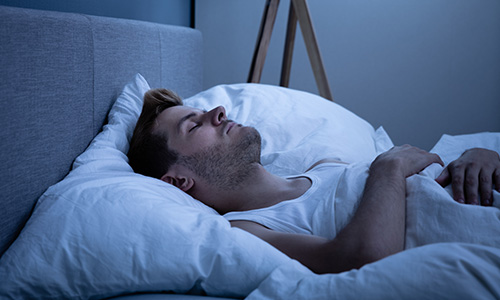What is sleep paralysis?
- Overview
What is sleep paralysis?

Sleep paralysis is a temporary inability to move or speak when you wake up during REM (rapid eye movement) sleep.
When you're in REM sleep, your body is relaxed to the point of paralysis, and your brain is very active, which mean dreams usually happen. So if you wake up suddenly during this stage of sleep, you become very aware that you can’t move your muscles.
Sleep paralysis happens very rarely for most people. It can be a scary feeling if you experience it, but just try to remember that it’s completely harmless.
What causes sleep paralysis?
Sleep paralysis can be caused by not getting enough good quality sleep. This could be due to your routine, particularly if you do shift work.
For some people, there may be a root cause that prevents them from getting a good night’s sleep, such as insomnia, narcolepsy, post-traumatic stress disorder (PTSD), general anxiety disorder or panic disorder.
What are the symptoms of sleep paralysis?
The main symptom of sleep paralysis is being aware of your surroundings but momentarily unable to move or talk. You may also find it difficult to breathe or open your eyes.
Sometimes you'll feel a tight sensation in your chest, like something is pressing down on you.
And because your brain is very active, you may even experience hallucinations. Some people say that they feel as if someone is in the room with them.
All of this can be quite frightening at the time, but these symptoms won’t harm your mind or body.
Should I worry about sleep paralysis?
No. In many cases, sleep paralysis is a one-off or very occasional event that happens randomly in people who are otherwise healthy.
However, if you regularly suffer from sleep paralysis, consult your GP to make sure there isn't an underlying issue.
How can I cure myself of sleep paralysis?
Sleep paralysis often gets better over time, and improving your sleeping habits and environment can help.
Here are five key things you can do to get a better night’s sleep:
- Avoid drinking alcohol or caffeine from late afternoon onwards
- Dim the lights around your house in the evening
- Avoid watching TV and using your phone for at least an hour before bed
- Keep your bedroom cool and dark
- Have a hot shower or bath before bed.
Read our article on Practical tips for a good night’s sleep for more advice.
You can beat sleep paralysis
Sleep paralysis should improve over time, and making small changes to your routine can help you to overcome it.
For more information, take a look at our Sleep Disorders Service page.
Last updated Monday 20 January 2020
First published on Monday 20 January 2020
